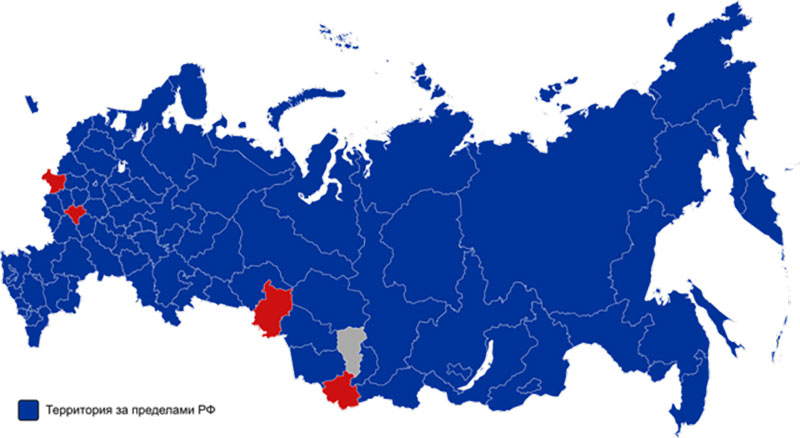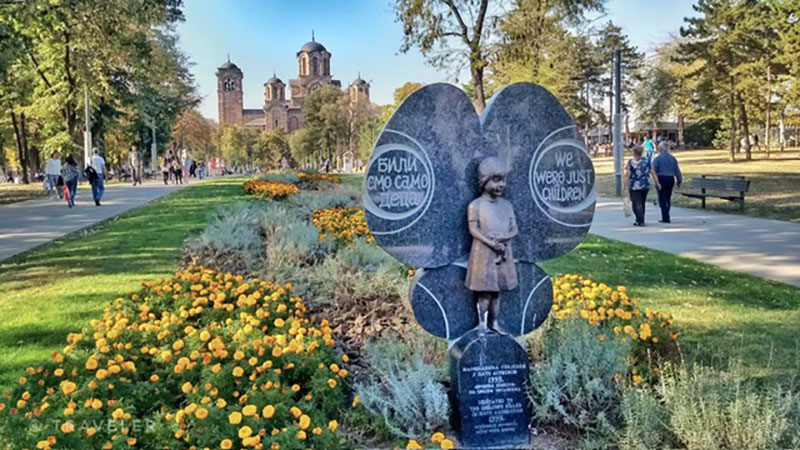Tucker Carlson’s Interview of Vladimir Putin - Part 4 of a Series

Commentary: In Part 3 of this series, Vladimir Putin spoke about the U.S. bombing of Serbia and its capital city of Belgrade in 1999. Former Russian Federation President Boris Yeltsin had strongly objected to this bombing. but the U.S. and NATO ignored his protests. Over several years, the Serbian province of Kosovo had been overrun by more than 840,000 Albanian Muslim migrants. Much of Kosovo is sacred to the history of the Serbian Orthodox Christian Church. Serbian President Slobodan Milosevic finally ordered Yugoslav/Serbian security forces to expel the migrants. U.S. President Bill Clinton decided to intervene in what was becoming a humanitarian crisis, deciding to bomb the Serbs into submission. About one thousand Serbian security force members were killed as well as at least 489 civilians, including 89 children. The result was Kosovo independence. Kosovo is now 92 percent Albanian and over 96 percent Muslim. Most of the Orthodox Christian Serbs were forced out of their former territory. Kosovo is now less than four percent Serbian Orthodox Christian, concentrated only in the northern edge of the formerly Serbian province.
Vladimir Putin Continued: Well, I became President in 2000. I thought: okay, the Yugoslav issue is over, but we should try to restore relations. Let's reopen the door that Russia had tried to go through. And moreover, I've said it publicly, I can reiterate. At a meeting here in the Kremlin with the outgoing President Bill Clinton, right here in the next room, I said to him, I asked him, ” Bill, do you think if Russia asked to join NATO, do you think it would happen?“ Suddenly he said: ”You know, it's interesting, I think so.“ But in the evening, when we had dinner, he said, ”You know, I've talked to my team, no-no, it's not possible now.“ You can ask him, I think he will watch our interview, he'll confirm it. I wouldn't have said anything like that if it hadn't happened. Okay, well, it's impossible now.
Commentary: In the 2000 election, Putin, who as Acting President and recent Prime Minister, received 53.4 percent of the vote in a field of 11 candidates. He led in 85 of 90 Federal Voting Districts. The Communist candidate was a distant second with 29.4 percent. The 2024 election will be March 15-17 with four candidates, Putin’s fifth elected term if he wins. Although Western media portrays Putin as an arch-villain, in polls of Russian voters his approval rating runs as high as 80 percent. In 2018, he received 76.7 percent of the vote, the Communist a distant second with less than 12 percent.

Tucker Carlson: Were you sincere? Would you have joined NATO?
Vladimir Putin: Look, I asked the question, ”Is it possible or not?“ And the answer I got was no. If I was insincere in my desire to find out what the leadership's position was…
Tucker Carlson: But if he would say yes, would you have joined NATO?
Vladimir Putin: If he had said yes, the process of rapprochement would have commenced, and eventually it might have happened if we had seen some sincere wish on the side of our partners. But it didn't happen. Well, no means no, okay, fine.
Tucker Carlson: Why do you think that is? Just to get to motive. I know, you’re clearly bitter about it. I understand. But why do you think the West rebuffed you then? Why the hostility? Why did the end of the Cold War not fix the relationship? What motivates this from your point of view?
Vladimir Putin: You said I was bitter about the answer. No, it's not bitterness, it's just a statement of fact. We're not the bride and groom, bitterness, resentment, it's not about those kinds of matters in such circumstances. We just realized we weren't welcome there, that's all. Okay, fine. But let's build relations in another manner, let's look for common ground elsewhere. Why we received such a negative response, you should ask your leader. I can only guess why: too big a country, with its own opinion and so on. And the United States – I have seen how issues are being resolved in NATO.
I will give you another example now, concerning Ukraine. The US leadership exerts pressure, and all NATO members obediently vote, even if they do not like something. Now, I'll tell you what happened in this regard with Ukraine in 2008, although it's being discussed, I’m not going to open a secret to you, say anything new. Nevertheless, after that, we tried to build relations in different ways. For example, the events in the Middle East, in Iraq, we were building relations with the United States in a very soft, prudent, cautious manner.
I repeatedly raised the issue that the United States should not support separatism or terrorism in the North Caucasus. But they continued to do it anyway. And political support, information support, financial support, even military support came from the United States and its satellites for terrorist groups in the Caucasus.
I once raised this issue with my colleague, also the President of the United States [Bush II] . He says, ”It’s impossible! Do you have proof?“ I said, ”Yes.“ I was prepared for this conversation and I gave him that proof. He looked at it and, you know what he said? I apologize, but that's what happened, I'll quote. He says, ”Well, I’m gonna kick their ass.“ We waited and waited for some response – there was no reply.
I said to the FSB Director: ”Write to the CIA. What is the result of the conversation with the President?“ He wrote once, twice, and then we got a reply. We have the answer in the archive. The CIA replied: ”We have been working with the opposition in Russia. We believe that this is the right thing to do and we will keep on doing it.“ Just ridiculous. Well, okay. We realized that it was out of the question.
Tucker Carlson: Forces in opposition to you? Do you think the CIA is trying to overthrow your government?
Vladimir Putin: Of course, they meant in that particular case the separatists, the terrorists who fought with us in the Caucasus. That's who they called the opposition. This is the second point.
The third moment, a very important one, is the moment when the US missile defense ABM system was created. The beginning. We spent a long time trying to persuade the United States not to do this. Moreover, after I was invited by Bush Jr.'s father, Bush Sr. to visit his place on the ocean, I had a very serious conversation with President Bush and his team. I proposed that the United States, Russia and Europe jointly create a missile defense system that, we believe, if created unilaterally, threatens our security, despite the fact that the United States officially said that it was being created against missile threats from Iran. That was the justification for the deployment of the missile defense system. I suggested working together – Russia, the United States, and Europe. They said it was very interesting. They asked me, ”Are you serious?“ I said, “Absolutely”.
Tucker Carlson: May I ask what year was this? [July 1-2, 2007]
Vladimir Putin: I don't remember. It is easy to find out on the Internet, when I was in the USA at the invitation of Bush Sr. It is even easier to learn from someone, I’m going to tell you about.
I was told it was very interesting. I said, ”Just imagine if we could tackle such a global, strategic security challenge together. The world would change. We'll probably have disputes, probably economic and even political ones, but we could drastically change the situation in the world.“ He says, ”Yes.“ And asks: ”Are you serious?“. I said, ”Of course.“ ”We need to think about it,“ I'm told. I said, ”Go ahead, please.“
Then Secretary of Defense Gates, former director of the CIA, and Secretary of State Rice came here to this office where we are now talking. Here, at this table, on the contrary, you see this table, they sat on this side. Me, the Minister of Foreign Affairs, the Minister of Defense of Russia are from the other side. They said to me, ”Yes, we have thought about it, we agree.“ I said, ”Thank God, great.“ – ”But with some exceptions.“
Tucker Carlson: So, twice you've described US presidents making decisions and then being undercut by their agency heads. So, it sounds like you're describing a system that is not run by the people who are elected, in your telling.
Vladimir Putin: That's right, that's right. In the end they just told us to get lost. I am not going to tell you the details, because I think it is incorrect, after all, it was a confidential conversation. But our proposal was declined, that’s a fact.
It was right then when I said: ”Look, but then we will be forced to take counter measures. We will create such strike systems that will certainly overcome missile defense systems.“ The answer was: ”We are not doing this against you, and you do what you want, assuming that it is not against us, not against the United States“. I said, ”Okay.“
Very well, that’s the way it went. And we created hypersonic systems, with intercontinental range, and we continue to develop them. We are now ahead of everyone – the United States and other countries – in terms of the development of hypersonic strike systems, and we are improving them every day.
But it wasn’t us, we proposed to go the other way, and we were pushed back.
Now, about NATO's expansion to the East. Well, we were promised, no NATO to the East, not an inch to the East, as we were told. And then what? They said, ”Well, it's not enshrined on paper, so we'll expand.“ So there were five waves of expansion, the Baltic States, the whole of Eastern Europe, and so on.
Commentary: On February 9, 1990, in a meeting with Soviet leader Mikhail Gorbachev negotiating the agreement to unify East and West Germany, U.S. Secretary of State James Baker agreed there would be no more eastward expansion of NATO. Baker’s famous words of assurance were “not one inch eastward.” Numerous contemporaneous documents confirm this at the highest levels. These documents reinforce former CIA Director Robert Gates’s criticism of “pressing ahead with expansion of NATO eastward, when Gorbachev and others were led to believe that wouldn’t happen.” President G.H.W. Bush had given Gorbachev a similar assurance at the Malta Summit in December 1989. Moreover, West German Foreign Minister Hans-Dietrich Genscher and Chancellor Helmut Kohl had insisted on it on January 31, 1990. Declassified national security documents also substantiate agreement by NATO Secretary-General Manfred Woerner, French President Francois Mitterrand, and the UK’s Margaret Thatcher, John Major, and Douglas Hurd. It also appears in Russian archives and Gorbachev’s personal memoirs.
Vladimir Putin: And now I come to the main thing: they have come to Ukraine ultimately. In 2008 at the summit in Bucharest they declared that the doors for Ukraine and Georgia to join NATO were open.
Now about how decisions are made there. Germany, France seemed to be against it as well as some other European countries. But then, as it turned out later, President Bush, and he is such a tough guy, a tough politician, as I was told later, ”He exerted pressure on us and we had to agree.“ It's ridiculous, it's like kindergarten. Where are the guarantees? What kindergarten is this, what kind of people are these, who are they? You see, they were pressed, they agreed. And then they say, ”Ukraine won't be in NATO, you know.“ I say, ”I don't know, I know you agreed in 2008, why won't you agree in the future?“ ”Well, they pressed us then.“ I say, ”Why won't they press you tomorrow? And you'll agree again.“
Well, it's nonsensical. Who's there to talk to, I just don't understand. We're ready to talk. But with whom? Where are the guarantees? None.
So, they started to develop the territory of Ukraine. Whatever is there, I have told you the background, how this territory developed, what kind of relations there were with Russia. Every second or third person there has always had some ties with Russia. And during the elections in already independent, sovereign Ukraine, which gained its independence as a result of the Declaration of Independence, and, by the way, it says that Ukraine is a neutral state, and in 2008 suddenly the doors or gates to NATO were open to it. Oh, come on! This is not how we agreed. Now, all the presidents that have come to power in Ukraine, they've relied on an electorate with a good attitude to Russia in one way or another. This is the south-east of Ukraine; this is a large number of people. And it was very difficult to dissuade this electorate, which had a positive attitude towards Russia.
Color Revolutions: The Beginning of the Orange Revolution
Viktor Yanukovych came to power, and how: the first time he won after President Kuchma – they organized a third round, which is not provided for in the Constitution of Ukraine. This is a coup d'état. Just imagine, someone in the United States wouldn’t like the outcome…
Tucker Carlson: In 2014?
Vladimir Putin: Before that. [2005, the Orange Revolution]









 Mike Scruggs is the author of two books: The Un-Civil War: Shattering the Historical Myths; and Lessons from the Vietnam War: Truths the Media Never Told You, and over 600 articles on military history, national security, intelligent design, genealogical genetics, immigration, current political affairs, Islam, and the Middle East.
Mike Scruggs is the author of two books: The Un-Civil War: Shattering the Historical Myths; and Lessons from the Vietnam War: Truths the Media Never Told You, and over 600 articles on military history, national security, intelligent design, genealogical genetics, immigration, current political affairs, Islam, and the Middle East. 


